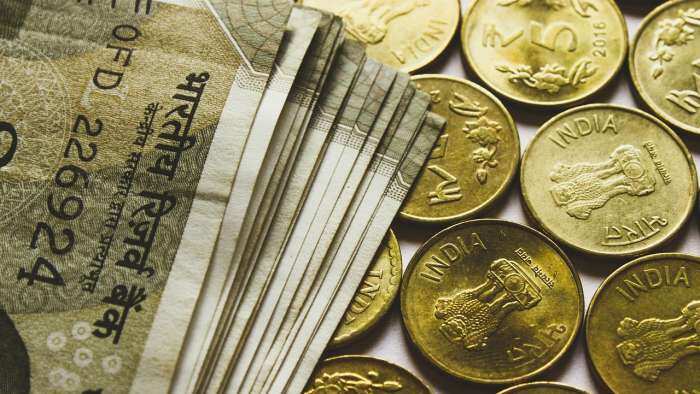Can the government ‘substantially cut’ expenditure to meet fiscal deficit target?
SBI said the fiscal deficit of 3.2% in FY18 does not seem difficult to meet. However government will have to reduce expenditure drastically.

Key Highlights
- SBI said target of 3.2% fiscal deficit not difficult for current fiscal.
- Shortfall in expenditure has been estimated to be Rs 1.1 lakh crore by SBI.
- Fiscal deficit will be no more impacted by 10 basis points in upward direction, SBI said.
The debate around India’s fiscal deficit target continued as State Bank of India on Monday ridiculed reports of revenue slippage by the government by stating they were ‘grossly misconstrued.’
“There are doomsday predictions currently that Government is going to have a big revenue slippage in FY18 which may impact the headline fiscal deficit numbers. However, such projections flunk the test of logical reasoning and are grossly misconstrued,” SBI said.
Fiscal deficit is a term for government spending which exceeds government revenues. A higher fiscal deficit places an additional financial burden on the economy.
However SBI seems to think that the government needs to reduce expenditure by a mere Rs 1 lakh crore to meet fiscal deficit target of 3.2% in FY18.
“There may still be a shortfall of Rs 1.1 lakh crore in the revenue receipts. To manage the fiscal deficit, Government however needs to cut expenditure substantially,” SBI said.
It further added, “We estimate that Government may cut around Rs 70,000 crore from capital expenditure and Rs 38,000 crore from revenue expenditure compared to budget estimate of FY18.”
India’s fiscal deficit as a percentage of gross domestic product (GDP) was reportedly second to last before Brazil in FY17, a report by Live Mint said.
The combined central and state fiscal deficit for FY17 was 6.5% of GDP. “Analysts estimate that the response to domestic agricultural distress through farm loan waivers could add 25-50 basis points to this number in the current fiscal year,” the report added.
Banking regulator, Reserve Bank of India (RBI) also spoke up against the number of loan waivers introduced by the governments of Uttar Pradesh, Punjab and Maharashtra. Loan waivers are expected to cost these states at least Rs 36,000 crore Rs 10,000 crore and Rs 25,000 crore respectively, as per government estimates.
An Edelweiss report suggested loan waivers may cost the government anything between Rs 1.3 lakh crore and Rs 2.3 lakh crore this fiscal.
A report by Bank of America Merrill Lynch estimated loan waivers to cost the government up to Rs 2.6 lakh crore.
"In the absence of coordinated and sustained efforts to put in place elements of a virtuous cycle of uplift of farmers' income, loan waivers have periodically emerged as a quick fix to ease their distress,” RBI’s Urjit Patel said in September.
SBI’s argument on fiscal deficit target of 3.2% in FY18 ‘seems not difficult,’ was also based on estimates that its disinvestment target has been met. In the current year so far, government has raised Rs 19,759 crore through minority stake sale in CPSEs and 'strategic disinvestment,' the report said.
“We believe that Government will able to meet the disinvestment target of Rs 72,500 crore as Rs 60,000 crore has already been achieved,” SBI said.
“Interestingly, the possibility of a lower than estimated 11.8% nominal growth is unlikely to translate to a higher fiscal deficit as nominal growth numbers for FY17 has already been revised upwards. We estimate even if the nominal growth declines to 10% from 11.8%, fiscal deficit will be no more impacted by 10 basis points in upward direction,” SBI added.
Also Read:
Get Latest Business News, Stock Market Updates and Videos; Check your tax outgo through Income Tax Calculator and save money through our Personal Finance coverage. Check Business Breaking News Live on Zee Business Twitter and Facebook. Subscribe on YouTube.
RECOMMENDED STORIES

SBI Senior Citizen FD Rate: Here's what State Bank of India giving on 1-year, 3-year, 5-year fixed deposits currently

SIP+SWP: Rs 10,000 monthly SIP for 20 years, Rs 25 lakh lump sum investment, then Rs 2.15 lakh monthly income for 25 years; see expert calculations

SBI Guaranteed Return Scheme: Know how much maturity amount you will get on Rs 2 lakh, 2.5 lakh, 3 lakh, 3.5 lakh and Rs 4 lakh investments under Amrit Vrishti FD scheme

SBI Senior Citizen Latest FD Rates: What senior citizens can get on Rs 7 lakh, Rs 14 lakh, and Rs 21 lakh investments in Amrit Vrishti, 1-, 3-, and 5-year fixed deposits

Power of Compounding: How soon will monthly SIP of Rs 6,000, Rs 8,000, and Rs 10,000 reach Rs 5 crore corpus target?
01:20 PM IST








 Fiscal deficit in April-September at 29.4 pc of full-year target: Govt data
Fiscal deficit in April-September at 29.4 pc of full-year target: Govt data Fiscal deficit stood at 8.1% of full-year target at June-end: CGA data
Fiscal deficit stood at 8.1% of full-year target at June-end: CGA data India on track to achieve target of 4.5% fiscal deficit by FY26: Nirmala Sitharaman
India on track to achieve target of 4.5% fiscal deficit by FY26: Nirmala Sitharaman How economists rate Finance Minister Nirmala Sitharaman's historic Budget 2024
How economists rate Finance Minister Nirmala Sitharaman's historic Budget 2024 Budget 2024 Goldman Sachs expects India to stick to 5.1% fiscal deficit target catch key takeaways
Budget 2024 Goldman Sachs expects India to stick to 5.1% fiscal deficit target catch key takeaways